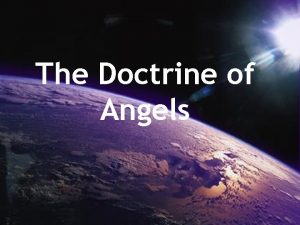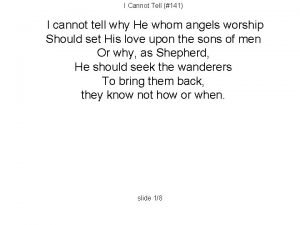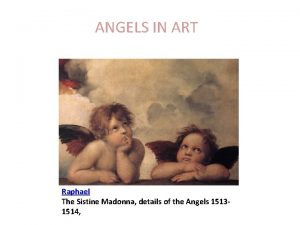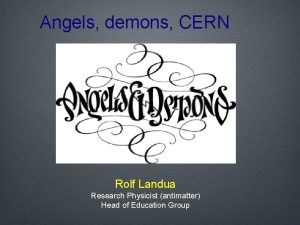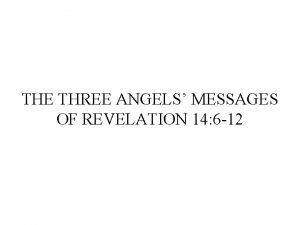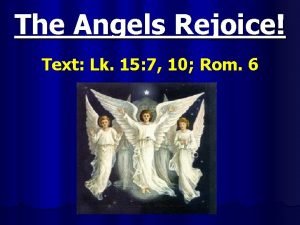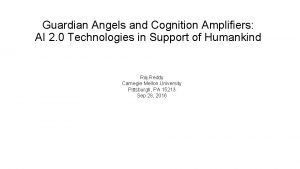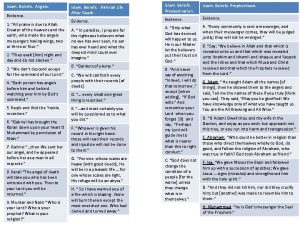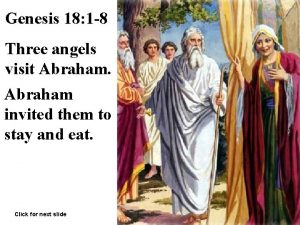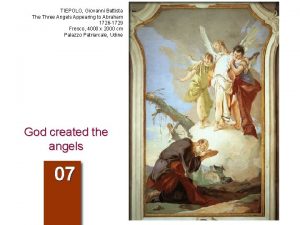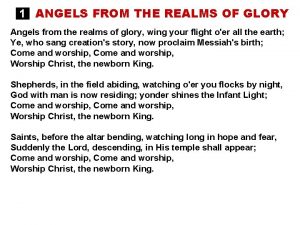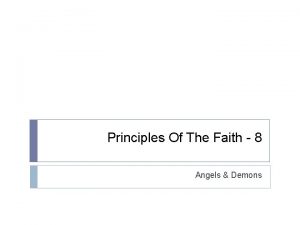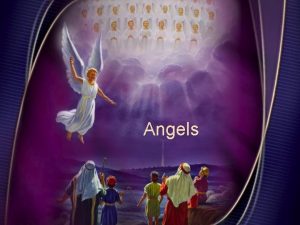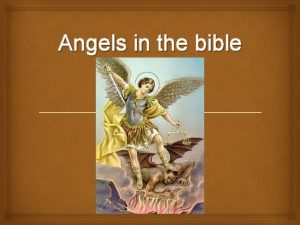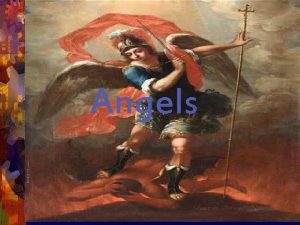The Doctrine of Angels The Doctrine of Angels











































- Slides: 43

The Doctrine of Angels

The Doctrine of Angels I. What is an angel? A. Generally speaking the term “angel” can be applied to “an ambassador, messenger, deputy or minister. ” 1. The term is used of human messengers (Luke 7: 24 a).

2. The term is used of the prophets (Hag. 1: 13). 3. The term is used of John the Baptist (Luke 7: 27). 4. The term is used of satanic messengers (II Cor. 12: 7).

B. Specifically speaking, an angel is a finite, spiritual and celestial being (Mt. 22: 30; Heb. 1: 4 -7).

II. How do we know that angels exist? A. In every section of the Old Testament the existence of angels is affirmed. 1. In the law (Gen. 28: 12). 2. In the history (II Sam. 14: 20; II Chr. 32: 21). 3. In the poetry (Ps. 34: 7; 91: 11; 103: 20).

4. In the prophets (Dan. 3: 28; 6: 22).

B. In every section of the New Testament the existence of angels is affirmed. 1. In the teaching of Jesus in the Gospels (Mt. 18: 10; 13: 41). 2. In the teaching of the Book of Acts (Acts 5: 19; 8: 26; 12: 7 -11). 3. In the teaching of Paul and the Apostles in the epistles (II Th. 1: 7; I Pet. 3: 22; Jude 9).

III. Why is the existence of angels questioned by some? A. Because of unbelief in the supernatural (Acts 23: 8). B. Because of ignorance of what the Scripture teaches. C. Because of fear of the unseen or invisible realm of spirit beings.

IV. What names and titles are ascribed to angels in the Bible? The following names and titles are ascribed to angels in the Bible: • Ministers or Servants (Ps. 104: 4). • Host or Army (Lk. 2: 13). • Watchers (Dan. 4: 13, 17).

• Sons of the Mighty or Mighty Ones (Ps. 89: 6; 29: 1). • Holy Ones or Saints (Ps. 89: 6 -7). • Sons of God (Job 1: 6; 2: 1; 38: 7). • Morning Stars (Job 38: 7). • Ministering Spirits (Heb. 1: 13 -14). • Flames of Fire (Ps. 104: 4; Heb. 1: 7).

V. What is the nature of angels? A. Angels are created beings (Col. 1: 16; Ps. 148: 2, 5). 1. They are each individually created for they do not reproduce after their kind as do animals and man (Mt. 22: 30). 2. They are each individually created and therefore are referred to as “sons of God” (Job 1: 6; 2: 1).

3. They are each individually created and hence they are dependent, finite and limited beings. 4. They were created prior to the creation of the earth and man (Job 38: 4 -7).

B. Angels are spiritual beings (Heb. 1: 14; Ps. 104: 4). 1. Angels are not limited by natural bodies, yet at times they appeared to men in visible, even human form (Gen. 19: 1; Judg. 2: 1; 6: 11 -12; Mt. 1: 20; 2: 13; Luke 1: 11 -13, 28 -29).

2. Angels are apparently pretty spectacular beings (Luke 1: 13, 30; 2: 10; Acts 27: 24). 3. Angels are limited by space and time even though they are spiritual in nature (Dan. 9: 21 -23; 10: 10 -14).

C. Angels are immortal (Luke 20: 36); therefore, once they are created, they never cease to exist.

D. Angels have all of the elements of personality. 1. They have intellect (Mt. 28: 5; I Pet. 1: 12). a. In intellect they are superior to man (II Sam. 14: 17). b. In intellect they are inferior to God (Mt. 24: 36; I Pet. 1: 12).

2. They have emotions (Job 38: 7; I Pet. 1: 12). 3. They have a will (Is. 14: 12 -15; II Pet. 2: 4; Jude 6).

VI. What are some other things that we know about angels? A. Angels are mighty, having great power (Ps. 103: 20; II Kgs. 19: 35; Is. 37: 36). 1. Their power is greater than man (II Pet. 2: 11). 2. Their power is delegated to them (II Th. 1: 7).

B. Angels exist in various ranks and orders (I Pet. 3: 22). 1. There are Seraphim (Is. 6: 2 -6). 2. There are Cherubim (Gen. 3: 24; Ezek. 10). Cherubim are more common in the Bible and seem to be a higher order of angelic beings associated with the ministry of guardianship and covering.

3. There are Archangels (Jude 9; I Th. 4: 16). • Michael (Jude 9; Rev. 12: 7) • Gabriel (Dan. 9: 21; Lk. 1: 19, 26) • Perhaps, Lucifer (Is. 14: 12 -14; Ezek. 28: 11 -17)

4. There was a being called the Angel of the Lord (Judg. 13; Ex. 3: 2 -15; Gen. 32: 24 -32).

C. Angels are very many in number (Heb. 12: 22; Mt. 26: 53; Dan. 7: 10; Ps. 68: 17). D. Angels are glorious beings who are usually clothed in white (Lk. 9: 26; Rev. 15: 1 -8). E. Angels are swift (Dan. 9: 21). F. Angels dwell in heavenly places even though they function here on earth (Mt. 22: 30; Eph. 3: 10; Jn. 1: 51).

G. Angels were involved in the delivery of the law to Moses (Acts 7: 53; Gal. 3: 19; Heb. 2: 2).

VII. What is the ministry and function of angels? A. Angels have a primary ministry unto God. 1. They were created to bring glory to God (Col. 1: 16; Rev. 4: 6 -11; Ps. 148: 2). 2. They are ministers of worship unto God (Is. 6: 3; Heb. 1: 6; Rev. 5: 8 -13).

3. They execute the will of God (Ps. 103: 20 -21). a. In controlling nature (Rev. 7: 1). b. In governing nations (Dan. 10: 13, 21; 12: 1). c. In executing God’s judgments (Gen. 19: 1; Ps. 78: 43, 49).

B. Angels have a unique ministry to the people of God (Heb. 1: 13 -14). 1. They protect the people of God (Ps. 35: 4 -5; 34: 7; 91: 11 -12; II Kgs. 6: 13 -17; Is. 63: 9; Dan. 6: 22; 12: 1; Heb. 1: 14). 2. They guide the believer at times (Acts 8: 26; 10: 3). In this sense they are deliverers of messages from the Lord.

3. They minister to the physical needs of God’s people (I Kgs. 19: 5 -8). 4. They strengthen and encourage the believer (Mt. 4: 11; Lk. 22: 43; Acts 5: 1920; 27: 24). 5. They seem to have a special ministry to children (Mt. 18: 10). 6. They serve as agents in the answering of our prayers (Dan. 10: 10 -12; Acts 12: 117).

7. They carry or escort the spirits of those who die in the Lord home (Lk. 16: 22). 8. They are interested in salvation and rejoice when a sinner comes to Christ (I Pet. 1: 12; Lk. 15: 10) 9. They will come with Christ for the believers at the Second Coming (II Th. 1: 7 -8; Mt. 25: 31 -32).

10. They will gather together the elect in conjunction with the Second Coming (Matt. 24: 31) separating the just from the unjust (Mt. 13: 39 -42, 47 -50).

VIII. What is the distinction between normal angels and the being called “The Angel of the Lord? ” A. Throughout the Old Testament we see the appearance of one called “The Angel of the Lord” or the “Angel of Jehovah” (Gen. 16: 9 -11; Num. 22: 2235; Judg. 6: 11 -22; 13: 3 -21).

1. The identity of this Angel seems to be a mystery (Judg. 13: 6). 2. There seems to be some sort of secret in regard to the name of this Angel (Gen. 32: 24 -32; Judg. 13: 6, 17 -18).

B. This Angel seems to have a special connection to Jehovah. 1. This Angel is a particular messenger of Jehovah (Gen. 16: 7 -14). 2. This Angel promises what only God can do (Gen. 16: 10).

3. This Angel is at times referred to interchangeably with Jehovah (Gen. 16: 13; Ex. 3: 2; Judg. 6: 12, 14; Zech. 3: 1 -2). 4. This Angel is reverenced as God (Judg. 6: 21 -22; 13: 22).

C. At the same time this Angel appears to be distinct from Jehovah. 1. This Angel testifies to Jehovah (Ju. 13: 16). 2. This Angel intercedes to Jehovah (Zech. 1: 9 -11). 3. This Angel calls upon Jehovah (Zech. 3: 1 -2).

D. This Angel is none other than a theophany of the Lord Jesus Christ before His incarnation. The word “theophany” means an appearance. 1. It should be noted that Jesus Christ was preexistent with the Father (Jn. 1: 1 -3, 14 -18).

2. It should be noted that Micah indicated that His “goings forth” have been from of old, from everlasting (Mi. 5: 2). 3. It should be noted that no such appearance of the Angel of the Lord occurs after Christ’s incarnation.

E. This Angel seems to have had a unique ministry which parallels Christ’s ministry. 1. Revelation. He was given the honor of revealing God’s name (Ex. 3: 2 -6, 14). Jesus revealed the Father to the world (John. 14: 9; 17: 6).

2. Commission. He commissioned Moses (Ex. 3: 7 -8 Acts 7: 30 -35), Gideon (Judg. 6: 11 -23) and had a big part to play in the call of Samson (Judg. 13: 1 -21). Jesus commissioned the leaders of the New Testament church (Mt. 28: 19 -20). 3. Intercession. He interceded for Israel when they were oppressed by their enemies (Zech. 1: 12 -13). Christ ever lives to make intercession for us (Heb. 7: 25).

4. Lawgiver. He was instrumental in the giving of the Law to Moses (Acts 7: 38). Jesus also sat on a mountain in the New Testament age and gave the laws of the kingdom (Mt. 5 -7).

IX. What should be our attitude toward angels? A. We may be in wonder and awe of them. 1. We may respect their persons (Dan. 8: 16 -17; 10: 1 -18). 2. We may appreciate their ministries (Heb. 1: 14). 3. We may admire their example.

B. We may not worship angels. 1. We are forbidden by example. The angels worship God alone (Is. 6: 1 -4; Rev. 4: 6 -11; 5: 8 -14). 2. We are forbidden by command (Ex. 20: 1 -6; Col. 2: 18). 3. We are forbidden by angels themselves (Rev. 19: 10; 22: 9).

X. What specific area of God’s dealing with man has not been entrusted to angels? Angels do not preach the Gospel. This task has been assigned to man (I Pet. 1: 12; Acts 10; 11: 13 -14).

 The doctrine of angels
The doctrine of angels I cannot tell why he whom angels worship
I cannot tell why he whom angels worship Jasher 4:18
Jasher 4:18 He could have called ten thousand angels verse
He could have called ten thousand angels verse Earl etienne dominica
Earl etienne dominica Raphael paintings angels
Raphael paintings angels Business angels europe
Business angels europe Angels singing to shepherds
Angels singing to shepherds If men were angels, no government would be necessary
If men were angels, no government would be necessary Cern angels and demons
Cern angels and demons Kabbalah
Kabbalah Carolingian art characteristics
Carolingian art characteristics James madison if men were angels
James madison if men were angels Glory glory how the angels sing
Glory glory how the angels sing Antimatter angels and demons
Antimatter angels and demons I cannot tell why he, whom angels worship
I cannot tell why he, whom angels worship Palsm91
Palsm91 Cherubim
Cherubim Queen of angels chicago
Queen of angels chicago Ceip angels garriga
Ceip angels garriga Nn angels
Nn angels Revelation 14:6-12
Revelation 14:6-12 Jesus higher than the angels
Jesus higher than the angels Arab business angels network
Arab business angels network Chatter with the angels
Chatter with the angels Evil angels scripture
Evil angels scripture The angels in heaven rejoice
The angels in heaven rejoice Angels singing to shepherds
Angels singing to shepherds Angels in amplifiers
Angels in amplifiers Even the angels long to know
Even the angels long to know Action angels
Action angels Husky air pilot angels
Husky air pilot angels Swedish lemon angels
Swedish lemon angels Have you heard the sound of the angels voices
Have you heard the sound of the angels voices Alliiteration
Alliiteration I wish i were an angel
I wish i were an angel The angels evidence
The angels evidence Three ps in first aid
Three ps in first aid Core angels portugal
Core angels portugal History of rope skipping
History of rope skipping Abraham invited the angels
Abraham invited the angels Hark the harold
Hark the harold Husky air pilot angels
Husky air pilot angels The three angels appearing to abraham
The three angels appearing to abraham
